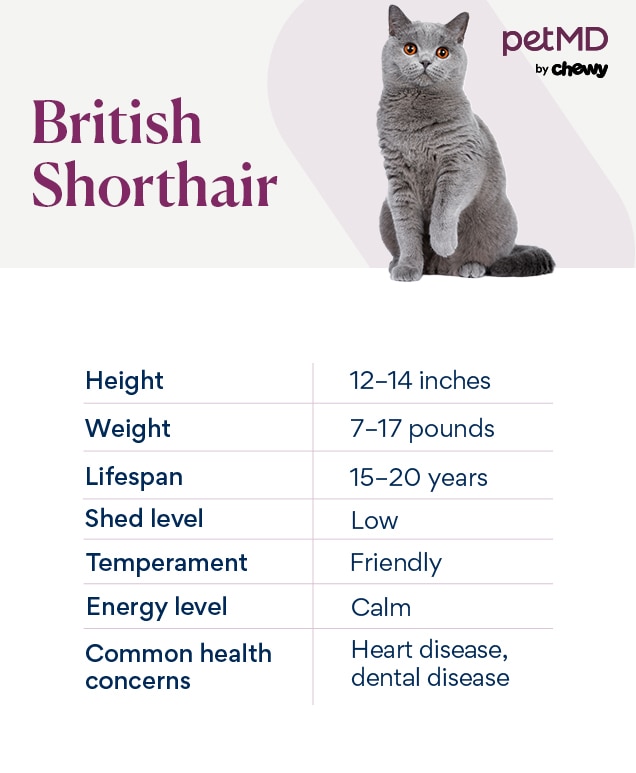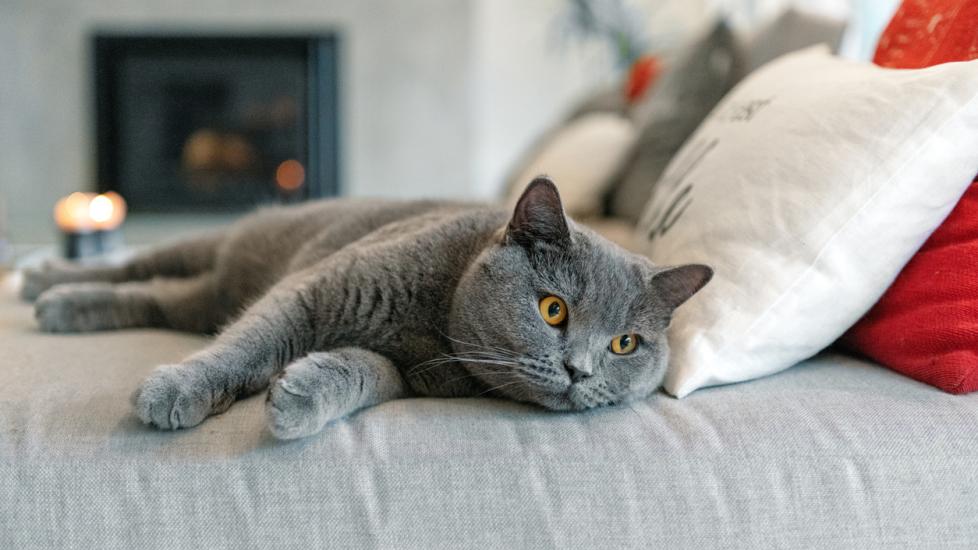British Shorthair
Described as the teddy bear of cat breeds both in looks and personality, the British Shorthair originated in ancient Egypt, migrating with humans to Rome and, later, to Great Britain. The British were happy to invite the cats in as household pets, since they had a knack for catching mice. However, with a personality suited to just about any type of household, British Shorthairs charmed their way up from working cats to cherished family members.
Today, British Shorthairs remain the most popular cat breed in the United Kingdom, both at cat fanciers’ shows and as family companions. Denser than they are tall, male British Shorthairs can weigh as much as 17 pounds and females as much as 12 pounds.
Caring for a British Shorthair

British Shorthairs aren’t a hyper or talkative breed, but they’re slow to mature. This means they’ll keep growing—and have a kitten-like personality—well into their third or fourth birthday.
Their fur is dense, and while they’re most likely to be associated with their famous “British blue” shorthair coat, they come in a variety of shades.
Whether British blue or another color, these loyal felines may be what most consider an ideal family cat. They’re cuddly and personable, yet they don’t require excessive care or attention. They have a pleasant disposition and happily cohabitate with various pets such as dogs, rabbits, and birds, provided they are introduced properly.
British Shorthair Health Issues
The average lifespan of the British Shorthair is a robust 12–20 years. The breed doesn’t have many genetic or common medical conditions but, like any cat breed, some common health issues can affect them. Purchasing pet insurance for your British Shorthair kitten can help cover any unexpected medical bills.
Hypertrophic Cardiomyopathy (HCM)
As the most common type of heart disease in cats, HCM can go undiagnosed in its early stages and often is only diagnosed once congestive heart failure symptoms arise. Asymptomatic cats are often diagnosed after a heart murmur is heard during a routine physical exam. Cats may experience breathing difficulties and lethargy as the disease progresses, potentially leading to heart failure.
When working with a reputable British Shorthair breeder, verify that their cats have been screened for HCM. If your cat is a rescue or adopted, at-home DNA kits may also detect HCM in cats before symptoms appear. Early detection of HCM is also possible during regular wellness exams.
Dental Disease
Early signs of dental disease include bad breath and gingivitis. All cats are at risk, but brushing your cat’s teeth and scheduling regular veterinary checkups and dental cleanings are the most effective methods of preventing oral disease in cats.
What To Feed a British Shorthair
British Shorthairs have a round face with chubby cheeks and prominent jowls, which makes them look like they’re always smiling. To keep up their charming appearance, they should eat high-quality commercial food. Feeding your British Shorthair food that meets or exceeds the Association of American Feed Control Officials’ (AAFCO) nutritional guidelines for their life stage will provide all the essential nutrients and vitamins they require.
How To Feed a British Shorthair
Because cats of varying ages have different nutrient requirements, cat foods are labeled based on the cat’s life stage. These labels include “growth,” “all life stages,” and “adult maintenance.”
British Shorthair kittens’ food should be formulated for growth or all life stages. As they reach adulthood (when they’re about 1 year old) kittens should switch to adult food.
Although British Shorthairs are relatively low-energy, they still enjoy playing each day. To alleviate mealtime boredom, offer meals or treats using food puzzles or lick mats, which mimic a cat’s natural foraging and hunting instincts.
How Much Should You Feed a British Shorthair?
There’s no standard portion size for cats because their calorie needs are influenced by age, lifestyle, and ideal body condition. Although British Shorthair cats are robust, they aren’t particularly athletic or lively, so talk to your veterinarian about the ideal portion size based on your cat’s individual requirements. Do not let your cat become obese, as this can lead to many health issues.
Nutritional Tips for British Shorthairs
The best cat food usually contains all the essential nutrients and vitamins that healthy cats and kittens require. However, for certain health problems, veterinarians may suggest additional vitamin and mineral supplements.
Behavior and Training Tips for British Shorthairs
British Shorthair Personality and Temperament
British Shorthair cats tend to be reserved, so they won’t constantly meow for attention. Although they enjoy sitting on laps, they prefer all four paws to be left on the ground rather than being lifted or carried. These cats are adaptable and gentle, which makes them excellent pets for almost any household, including families with small children, first-time pet parents, and multi-pet homes.
Initially, the British Shorthair may feel a bit intimidated when meeting a new person or pet. However, after proper introductions, they’ll consider any well-mannered human or animal a companion. Although they enjoy spending time with their humans, they don’t mind being alone for a few hours at a time. In fact, British Shorthairs have an independent side that relishes time spent on their own.
British Shorthair Behavior
They’re skillful hunters, although they’d much rather hunt a toy mouse than a real one these days. Between small bursts of activity, they might cuddle up with their human or favorite furry companion rather than wander around the house looking for trouble.
These cats also value their independence and aren’t prone to separation anxiety, which makes them a great choice for busy households. Typically, this breed is quiet, easygoing, and sociable with humans and other animals.
British Shorthair Training
The British Shorthair is a cat that enjoys pleasing their pet parents, making reward-based training a suitable approach for this feline. To reduce the likelihood of unwanted behaviors, strive for early socialization, careful introductions, and an enriching environment.
Fun Activities for British Shorthairs
-
Interacting with their human or furry companions
-
Hunting small toys
-
Bird watching
-
Napping in the sun
British Shorthair Grooming Guide
Although British Shorthairs aren’t high-maintenance cats, they need regular grooming and care to look and feel their best.
Skin Care
British Shorthairs don’t require any specific skin care, and they are not particularly susceptible to skin conditions. However, if you notice signs of skin irritation or itching, schedule a checkup with a veterinarian.
Coat Care
Regularly brushing the British Shorthair reduces shedding and prevents matting. While British Longhairs exist, they’re a separate breed created by crossing a British Shorthair with a Persian.
Eye Care
British Shorthairs have large, round eyes. The hallmark blue-coated cats have orange-amber eyes, but the breed can have green, copper, amber, or blue eyes. While they don’t require special eye care, any eye discharge should be evaluated by a veterinarian.
Ear Care
Check your cat’s ears for waxy buildup or other debris. If needed, cats’ ears can be cleaned with a veterinarian-approved ear cleaner. Any itchy ears, discharge, or foul odors warrant a checkup with your veterinarian.
Considerations for Pet Parents
British Shorthairs are popular cats, thanks to their charming appearance and personality. They are cuddly, personable, and can live up to 20 years. British Shorthairs have an independent side that relishes time spent alone, but they are adaptable and gentle, making them excellent pets for various households.
There are not many genetic diseases associated with British Shorthair cats, and they require little maintenance beyond normal grooming and preventive vet visits.
British Shorthair FAQs
How much does a British Shorthair cat cost?
British Shorthair kittens from a reputable breeder can cost $500–$4,500 depending on location, age, and pedigree. British Shorthair cats may be available for adoption from specialty purebred rescues as well.
Are British Shorthair cats hypoallergenic?
British Shorthairs have a short, plush coat, but they aren’t hypoallergenic cats. Because allergens are found in a cat’s skin and saliva, not just the fur, there’s actually no such thing as a hypoallergenic cat.
What colors are British Shorthair cats?
“British blue” is the most famous British Shorthair color. However, British Shorthair cats come in all colorations and coat patterns. According to NW British Cat Cattery, the most luxurious of the British Shorthair coat colors is the British Chinchilla, which has silver fur that sparkles in the light and comes with bright blue or green eyes.
Featured Image: iStock/lisegagne
